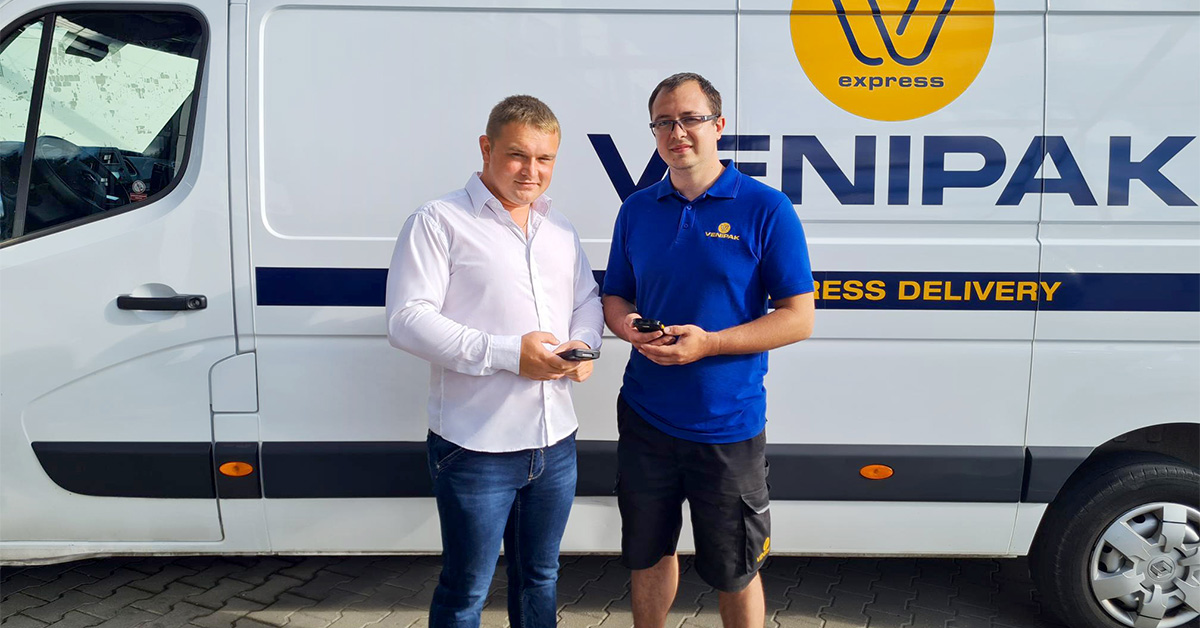Logistics Specialist Artjoms Miklašēvičs started working for Venipak in 2015. His first position was a courier. “I came to join because my friend worked there. I heard great feedback and wanted to try something new, a new sector. Before that, I had worked in woodworking while wanted a more active career field, communication with people,” Artjoms says.
Requested profession
Affected by Covid-19, the e-commerce industry has experienced a new boom and, accordingly, has brought changes in the labour market – courier is one of the most demanded professions. No less important is the role of a logistics specialist to organise the most efficient delivery routes, courier schedules, analyse market trends and search for the most appropriate service providers, ensure good relations with representatives of warehouses and cooperation partners, prepare customs documents. These and many other job responsibilities are the invisible part that helps online purchases to reach the end consumer quickly and flawlessly.
Normunds Krūmiņš, Chairman of the Board of the Latvian Logistics Association, also comments on the request of the position: “Logistics specialists are and will be in demand in any industry where goods need to be procured, stored and dispatched. Efficient and effective management of all these business functions is critical in the current business world.”
Logistics specialist in 4 years
It seems to many that there is no growth in the courier profession, but Artjom’s story proves otherwise. He says: “I liked being a courier – being on the move, planning my route to make it to the gate as quickly as possible. The response and positive feedback from the package recipients was also inspiring.” After about a year and a half, he was promoted to the position of senior courier. In this position he had to stay more in the office, process invoices and perform other types of clerical tasks. Departures for delivery trips were less frequent, but still pleasant. Being appreciated for his responsibility, care for details and ability to keep the peace in conflict situations, Artjoms was invited to become an assistant logistics specialist. The job responsibilities were similar, but already included planning transport procedures and schedules, preparing work orders for drivers, concluding contracts, cooperating with freight forwarders, transport organisations, local and international suppliers and customers, as well as experts from other departments.
Shortly thereafter, Artjoms also became a logistics specialist. “It is a critical activity, because it includes not only delivery-related tasks, but also relationship building, finding solutions to problems. It is challenging but rewarding too. The work is not monotonous. There are various changes both globally and within the company, we are constantly looking for ways to improve processes,” he explains. The growth from a courier to the logistics specialist took about 4 years.
The role of logistics in the economy is growing
Due to the situation caused by the pandemic and restrictions on movement, logistics will continue to be an area of importance, which is why Venipak is investing in the professional development of its employees. Artjom has used the opportunity to improve his knowledge in various courses, for example, on how to act in crisis situations, in communication with customers. “I really appreciate Venipak’s attitude towards employees. Although the work load has increased and conditions are more complicated, the company ensures that we receive all the necessary devices, personal protective equipment. It is interesting to be involved in processes that help improve logistics services, make them more secure, such as the new contactless parcel terminals.”
When the pandemic started and the number of parcels served scaled up massively, the cooperation partners and customers made allowances. Not less important was Artjoms’ resilience to stress, ability to respond to various surprises or challenges, and many lessons learned. He says he still likes to get up in the morning and pursue the work, because the team, including couriers, are waiting for his assignments. He has to look for or help to find new solutions.
According to Venipak, as a result of the market changes caused by the pandemic, the company now employs 20% more couriers. Logistics specialists have also become even more important than before. The progress in professional prospects has also extended the employment time among couriers, some of whom have been working in this position for 10 years. The company has also established the Venipak Academy, a training platform that provides ongoing theoretical and practical training for couriers and other professionals. The training programme also includes discussions about the company’s traditions and internal culture, since the company’s growth depends on the successful integration of new team members into the company’s environment.




